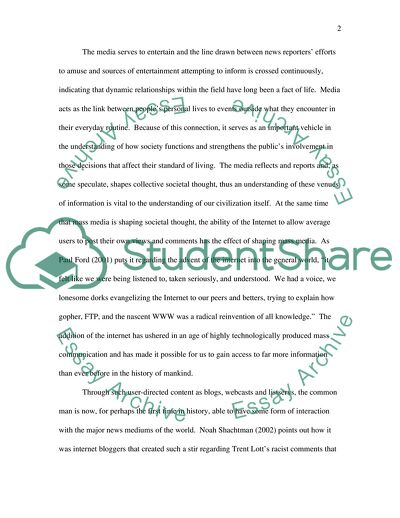
- Home
- Free Samples
- Premium Essays
- Editing Services
- Extra Tools
- Essay Writing Help
- About Us
- Studentshare
- Subjects
- Miscellaneous
- With reference to particular examples discuss the dynamic relationship between old and new media
With reference to particular examples discuss the dynamic relationship between old and new media - Essay Example

- Subject: Miscellaneous
- Type: Essay
- Level: Ph.D.
- Pages: 4 (1000 words)
- Downloads: 0
- Author: dino21
Extract of sample "With reference to particular examples discuss the dynamic relationship between old and new media"
“Nowadays, we think nothing of emailing our aunts in Germany and getting an answer back within minutes, or seeing the latest streaming video full of up to the minute news” (Boswell, 2006). Neither letter-writing nor newspaper delivery can provide the instant information that is today essential for businesses in the modern world to compete effectively and simply a fact of life that is taken for granted for most in the developed world. People are now turning to alternative forms of receiving information, such as blogs, video blogs, webcasts, chatrooms and listservs, which has necessitated a fundamental shift in the way old media must now work with new media if it wishes to survive.
The media serves to entertain and the line drawn between news reporters’ efforts to amuse and sources of entertainment attempting to inform is crossed continuously, indicating that dynamic relationships within the field have long been a fact of life. Media acts as the link between people’s personal lives to events outside what they encounter in their everyday routine. Because of this connection, it serves as an important vehicle in the understanding of how society functions and strengthens the public’s involvement in those decisions that affect their standard of living.
The media reflects and reports and, as some speculate, shapes collective societal thought, thus an understanding of these venues of information is vital to the understanding of our civilization itself. At the same time that mass media is shaping societal thought, the ability of the Internet to allow average users to post their own views and comments has the effect of shaping mass media. As Paul Ford (2001) puts it regarding the advent of the internet into the general world, “it felt like we were being listened to, taken seriously, and understood.
We had a voice, we lonesome dorks evangelizing the Internet to our peers and betters, trying to explain how gopher, FTP, and the nascent
...Download file to see next pages Read MoreCHECK THESE SAMPLES OF With reference to particular examples discuss the dynamic relationship between old and new media
The Impact of New Media on CRM-Systems
Issues in the Organizational Culture
Relationships and Connections of Variables
The Cultural Significance of Urban Development
Where Old and New Media Collide
The Media Policies in the UK and Libya
Modern Relationships
Changing Relationships of Media, Police and Society

- TERMS & CONDITIONS
- PRIVACY POLICY
- COOKIES POLICY